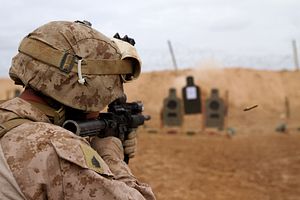“I feel strong indignation at this inhumane and contemptible act of terrorism. I will never forgive these terrorists. Japan will work with the international community to bring those responsible for crimes to justice,” Japanese Prime Minister Shinzo Abe pledged in response to the apparent murder of two Japanese nationals, Haruna Yukawa and Kenji Goto, by the Islamic State (IS) after a 12-day long hostage crisis. This is the first time that Japan, wrapped in the cocoon of its pacifist constitution and resting comfortably under the U.S. security umbrella, has reacted with such a spirit of vengeance.
It is too soon to tell how this hostage crisis will affect Japan’s security legislation debate, but one thing is for certain: the Japanese worldview will never be the same. As Kunihiko Miyake, former Japanese diplomat, said to The New York Times, “This is 9/11 for Japan. It is time for Japan to stop daydreaming that its good will and noble intentions would be enough to shield it from the dangerous world out there. Americans have faced this harsh reality, the French have faced it, and now we are, too.”
The world is a dangerous place – and Japan is a part of it. While sakoku (a strict isolationist policy) worked in the 17th century to keep Japan safe, it is no longer a policy option for the 21st century. No matter how hard Japanese pacifists might try to distinguish their country from its more martial American patron, at the end of the day, both nations share the same interests: a rule-based international order and a world that promotes democratic governance and universal human rights. Japan cannot expect that radicals such as the IS will care to distinguish between the two. There are risks to being a U.S. ally, and Japan has simply been extraordinarily lucky in avoiding most of the drawbacks until now.
While in the immediate aftermath of the crisis a rally-round-the-flag syndrome has gripped grief-stricken Japanese, opposition parties and other critics of the Abe government are already starting to question the wisdom of Japanese involvement in the Middle East. Opposition parties plan to grill Shinzo Abe on his choice to give humanitarian aid to states fighting the IS, and to have visited the Middle East at all, while it was known that the IS was holding two Japanese captives.
Such criticism implies that the Japanese government should have sat on its hands and done nothing, while letting the U.S.-led coalition do all the heavy lifting. A cynic would, perhaps rightly, challenge the claim that the IS was a threat to Japan. If Japan had not gone out of its way to get involved in the Middle East, some critics argue, IS would not have become a threat to Japanese expatriates.
Yet, it was clear that the aid Japan offered was for humanitarian purpose: the purported connection between this non-military aid and the beheadings is nothing more than an excuse, a pretext that the IS used to sow confusion and dissent in Japan. As painful as the truth is, once Yukawa and Goto were captured, it was unlikely that they would have been released.
Let’s be clear: Japan is not going to get militarily involved. While Shinzo Abe announced that he would be increasing the amount of humanitarian assistance to the Middle East, he also affirmed that Japan will neither join the U.S.-led coalition’s air-bombing operations nor provide logistical support, such as flying air refueling missions. Despite the shock-and-horror quality of the events of the past two weeks, it will take a long time for Japan to adjust its anti-militarist culture – and that is a good thing. Japan should not move too hastily to change its international role, because that would not only upset the delicate power balance closer to home, but would also dishonor the memory of the two men by using their deaths as cheap political gambits.
Nevertheless, Shinzo Abe and his government will certainly step-up their counter-terrorism efforts and continue to push the country towards a more active role in international affairs, as evidenced by Chief Cabinet Secretary Yoshihide Suga’s statement: “Japan will never give in to terrorism and will extend more humanitarian support to the Middle East. Japan will keep a firm attitude and fulfill its responsibility in the international community fighting terrorism.”

































